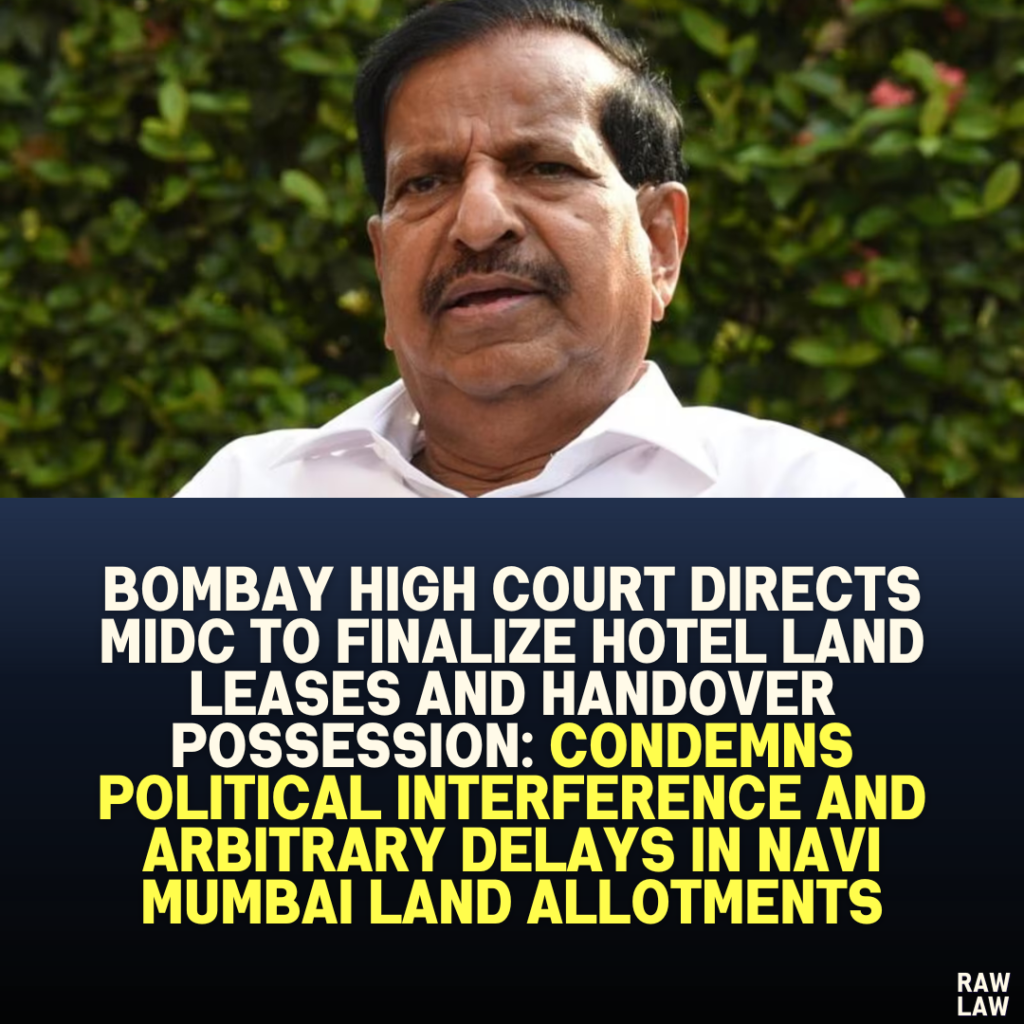The Bombay High Court directed the Maharashtra Industrial Development Corporation (MIDC) to execute the lease agreements for the petitioners’ allotted lands and hand over physical possession within six weeks. The court criticized MIDC’s inaction, influenced by political interference, and declared it manifestly arbitrary and contrary to legal obligations.
Facts:
- Petitioners and Allotments:
- Writ Petition 15309 of 2023: M/s Bikaner Sweets & Namkin NX-2 sought possession of land allotted for developing a hotel in the Trans Thane Creek (TTC) Industrial Area, Mahape.
- Writ Petition 10246 of 2024: Siddhilaxmi Enclave Pvt. Ltd. faced similar issues regarding allotted plots in the same area for a hotel project.
- Procedural Compliance:
- The petitioners had complied with all procedural requirements, including premium payments.
- MIDC issued allotment orders, followed by corrigenda, but failed to execute the lease agreements or hand over possession.
- NMMC Intervention:
- Navi Mumbai Municipal Corporation (NMMC) raised objections, claiming the land was needed for parking and public utility.
Issues:
- Was MIDC’s failure to execute lease agreements and hand over possession justified under the law?
- Could the January 4, 2024 instruction, allegedly issued under Section 18 of the MIDC Act, serve as a valid policy direction to stall the projects?
- Did political interference override the rights of the petitioners?
Petitioners’ Arguments:
- The petitioners argued that MIDC’s inaction, despite full compliance, amounted to a breach of statutory duty.
- They claimed the January 4, 2024 instruction lacked procedural validity and was not a binding policy direction under Section 18 of the MIDC Act.
- They sought judicial intervention to secure their rights to the allotted lands.
Respondents’ Arguments:
- MIDC contended that the January 4, 2024 instruction from the State Government directed them to halt further processing of the leases.
- NMMC argued that developing the plots would exacerbate parking issues and vehicular accidents in the area.
Analysis of the Law:
- Section 18 of the MIDC Act:
- The court emphasized that directions under Section 18 must pertain to policy matters and not specific projects.
- The January 4, 2024 instruction did not qualify as a valid policy direction under the law.
- Judicial Review:
- Even if the instruction were valid, it would be subject to judicial review under Article 226 for manifest arbitrariness and lack of reasoning.
- Legal Obligations:
- MIDC’s statutory duty included executing agreements and handing over possession once procedural requirements were met. Failure to do so violated legal principles.
Precedent Analysis:
- The court referred to prior cases highlighting the sanctity of statutory obligations and the limits of executive interference.
- It reiterated that planning and development must align with approved frameworks and cannot be arbitrarily altered.
Court’s Reasoning:
- Political Interference:
- The January 4 instruction, influenced by local political representatives, was ambiguous and lacked legal standing.
- MIDC’s inaction was deemed arbitrary and unsupported by law.
- Violation of Rights:
- MIDC’s delays undermined the petitioners’ rights, forcing them to seek judicial redress unnecessarily.
- Planning and Development:
- Arbitrary interference in planned development eroded the sanctity of the process and disrupted public trust.
Conclusion:
The court allowed both writ petitions, directing:
- Execution of lease agreements within six weeks.
- Handover of physical possession of the allotted lands.
- Reporting compliance by February 3, 2025.
The judgment underscores the necessity of adherence to statutory processes, protection of stakeholders’ rights, and resistance to arbitrary political interference.
